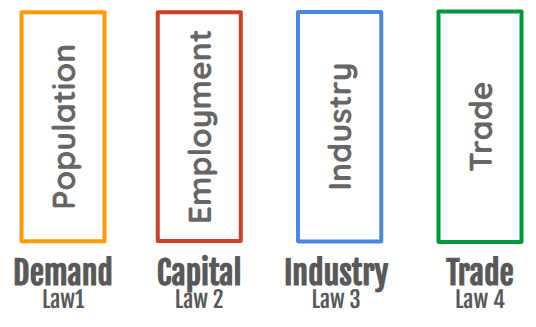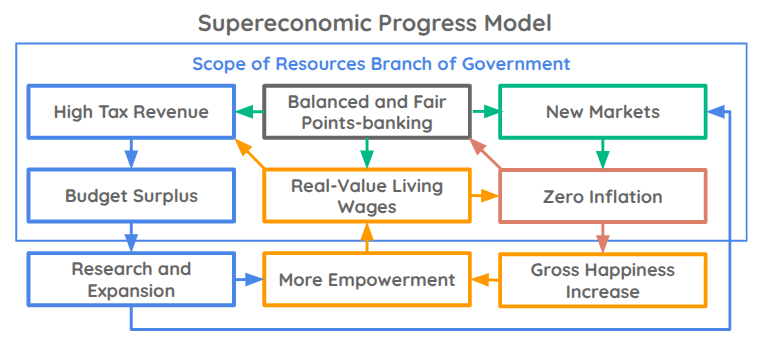Supereconomic Solutions
Table of Contents
The violations of the Four Laws lead to known economic problems mentioned from Chapters 3 to 6. The knowledge of the laws can lead to individual solutions to isolated problems. For example, investment scams that violate the Fourth Law of fairness can be easily prevented by legislation and active enforcement.
However, there are many problems that are systemic, such as high prices, unemployment, poverty, congested cities, crop failure from global warming, etc. These come from the violations of more than one law since the laws are interconnected just as waves never exist in isolation (though particles can).
These require a systemic solution as the Usufruct Economy (US) deployed through Economy-as-a-Service. To prevent problems from creeping into the system, measures and tools have to be used just like how a regular physical exam can expose health problems early, allowing prevention and easier remedy.
Supereconomic Ratios
Businesses use financial ratios such as current ratio (to measure current assets versus current liabilities) and ROI (net income versus investment). Supereconomics also uses ratios, broadly classified under Demand, Capital, Industry, and Trade, representing the Four Laws. Examples for each law are:
- Population Size versus Minimum Needs
- Investments versus Returns
- Realized Value versus Projected Value
- Pool Deficit versus Pool Surplus (of Pool Clearing)

Here, we give a brief example how the US can solve a representative problem of each Law.
Violations of Law 1: The Poverty Cycle
The main solution is for the Usufruct System to provide minimum needs facilitated through barter-credits. This fulfills the “living standard” domain of the Gross National Happiness (GNH) index. The upgrade of technical education and skills, as part of the “education” domain of the GNH, can be provided at low cost through apprenticeships where the practical learner could pay with his output, as proposed by Adam Smith:
“A young man’s education would be more effective, less tedious, and less expensive if he began working diligently as a journeyman. He would be paid in proportion to the little work he could do and pay for the materials that he might spoil.”
Adam Smith
The Wealth of Nations, Book 1, Chapter 10
Violations of Law 2: Overpriced/Underpriced Valuation
Xtech, as part of the Usufruct System, solves valuation by having a record of real-value transactions that are validated through Points Banking. This is similar to how banks check the financial statements and track record of loan applications.
The main difference is that the Usufruct System values all prices ultimately in the value of grains which everyone in the world can relate to. This allows the comparison of real values, whether by job applicants applying for the same job, or by companies selling themselves to new owners*.
*In the Usufruct System, moneyless investing is used and so stock trading does not make sense. Instead, excess money goes into the clearing funds of the Pool Clearing system to spur world trade and exchange.
Violations of Law 3: Moral Hazard
The concept of moral hazard became common after the 2008 Financial Crisis wherein banks transferred their insurance risk to the government and therefore to the people. This is most common in health insurance. The Usufruct System (US) allows moneyless insurance wherein the behavior of participants are monitored to prevent risky activities. This uses the maxim prevention is better than cure.
This real-time monitoring is consistent with the US being a non-liberal system. But people can democratically opt out of certain monitoring and therefore lose certain safety nets. In this way, the system provides real value in real-time, to match the projected value and expectations of the people.
Violations of Law 4: Inflation Versus Recession
Economics uses fiat money supply to regulate the “heat” of an economy. This leads to a lose-lose situation: reducing interest rates leads to inflation, but raising them leads to recession.
In contrast, the Usufruct Economy uses real valuation which eliminates the time value of money and therefore incurs no interest. Barter-credit scores from Xtech are used in conjunction with credit scores to rank each person based on reciprocity, as a measure of fairness.
If a person misses some money repayments to a loan because of truly unforeseen circumstances, then the Usufruct System can switch to repayment in kind as a temporary measure. This will end debt slavery while ensuring that the points-banker receives something that it can give to the depositors who provided liquidity for the loan.
In Pool Clearing, a deficit country is one that imports more value than it exports to the pool. This reduces its employment and therefore has less of its minimum needs addressed. To solve this, its employment is spurred by the pool by encouraging its tourism, services, agriculture, etc. for the use of pool members. For example, the citizens of member countries will be encouraged to take a vacation in the deficit country by an advantageous exchange rate in the clearing system for tourism purposes.
The Supereconomic Model of Progress
The Usufruct System harnesses the cooperation of the Four Laws in order to provide happiness beyond the material or physical domain. This is then implemented through Economy-as-a-Service or the Resources Branch of government.

This is totally different from the modern economic system which is designed to take advantage of society to advance selfish pleasures, mostly of those who belong the merchant class, as those who live by profits. This is why they overthrew Political Economy and replaced it with Neoclassical Economics which has profit maximization as a key doctrine.
The other classes or workers and landlords (governments), and even the planet, have patiently endured this systemic oppression. Unfortunately, from the 21st century, Economics has overstepped the red line set by Nature and has started to fight back through natural disasters as supertyphoons, floods, wildfires, droughts, etc. This gives us an opportunity to bring back the correct science of economics that was formulated when the human species was far less greedy and still had the concepts of metaphysics and love for Nature.